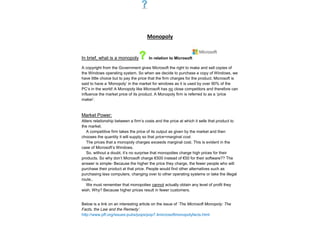
' Laskcjdbhjalspdj
- 1. Monopoly In brief, what is a monopoly In relation to Microsoft A copyright from the Government gives Microsoft the right to make and sell copies of the Windows operating system. So when we decide to purchase a copy of Windows, we have little choice but to pay the price that the firm charges for the product. Microsoft is said to have a ‘Monopoly’ in the market for windows as it is used by over 90% of the PC’s in the world! A Monopoly like Microsoft has no close competitors and therefore can influence the market price of its product. A Monopoly firm is referred to as a ‘price maker’. Market Power: Alters relationship between a firm’s costs and the price at which it sells that product to the market. A competitive firm takes the price of its output as given by the market and then chooses the quantity it will supply so that price=marginal cost. The prices that a monopoly charges exceeds marginal cost. This is evident in the case of Microsoft’s Windows. So, without a doubt, it’s no surprise that monopolies charge high prices for their products. So why don’t Microsoft charge €500 instead of €50 for their software?? The answer is simple- Because the higher the price they charge, the fewer people who will purchase their product at that price. People would find other alternatives such as purchasing less computers, changing over to other operating systems or take the illegal route.. We must remember that monopolies cannot actually obtain any level of profit they wish. Why? Because higher prices result in fewer customers. Below is a link on an interesting article on the issue of ‘The Microsoft Monopoly: The Facts, the Law and the Remedy’. http://www.pff.org/issues-pubs/pops/pop7.4microsoftmonopolyfacts.html
- 2. Why monopolies arise? Monopoly: A firm that is the sole seller of a product without close substitutes. Firms are said to have a monopoly power if they are a dominant seller in the market and can exert some control over the market because of this. The fundamental cause of a monopoly is ‘’barriers to entry’’: a monopoly stays the only seller in its market as other firms cannot enter/compete with it. Barriers to entry have four main sources: Key research owned Barriers To by single firm Entry Government gives a firm A firm can gain control the exclusive right to of other firms in the produce some good/service market and therefore grow in size Costs of production make a single producer more efficient than large numbers of producers
- 3. Example- owner of a well Exclusive ownership of has a monopoly on water a key resource is Firm owning a key potential cause of a resource monopoly Monopoly Resources Monopolists have much Monopolies greater market power rarely arise than single firms in because if this competitive markets Monopolists can charge high price for necessities like water There are few examples of firms that own a resource that has no close substitutes Monopolies happen Patent/Copyright laws are used as Government has by Government to create a given one monopoly to serve public person/firm the right interest to sell a good/service Government Eg:Pharmaceutic European Kings used to al companies grant exclusive licences created applying for a to friends and allies to patent raise money monopolies Laws on Governments can Patents/Copyrights give patents/copyrights grant a monopoly as 1 producer a monopoly have benefits and it’s viewed to be in costs the public interest. Higher prices occur Privatization of alcohol would In Sweeden-can control result in fatal accidents, suicides directly the sale of alcohol etc.